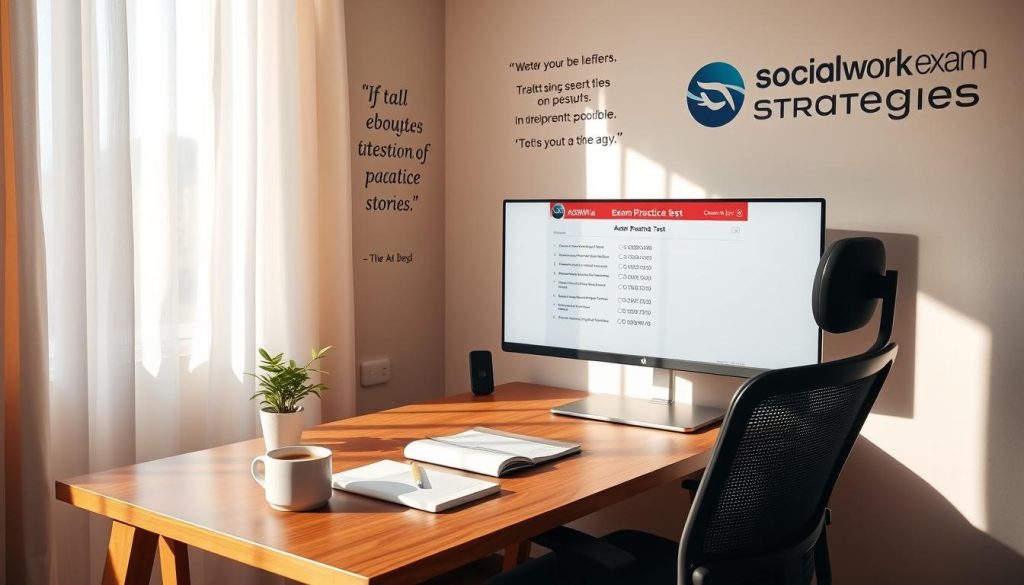Becoming a licensed social worker is a significant milestone in your career, but the ASWB exam can be a daunting hurdle. With 1 in 3 first-time test-takers failing due to insufficient preparation, it’s crucial to assess your exam readiness effectively.
At Social Work Exam Strategies, we understand the challenges you face. Our comprehensive Social Work Exam Prep Online program is designed to boost your knowledge and confidence. But the question remains: are you truly ready for the ASWB exam?
Understanding your practice test results is more than just checking scores; it’s about identifying patterns, knowledge gaps, and building test-taking confidence. Our expert insights will guide you through interpreting your results and determining your readiness for the actual exam.
Practice tests are an essential tool for anyone preparing for the ASWB exam. As a social worker, understanding the significance of these practice tests can make a substantial difference in your exam performance. Our support services include expert-led training programs to help you understand the new ASWB testing guidelines and practice exam resources to prepare you for the licensing exam changes.
ASWB practice tests are designed to measure your knowledge and readiness for the actual exam. They assess your understanding of the exam content, helping you identify areas that require further study. By taking practice tests, you can gauge your performance and adjust your study plan accordingly. For instance, our Agents of Change practice exam recommends a score of at least 120 before taking the official ASWB exam.
Practice tests offer several benefits that are crucial for exam success. They reveal knowledge gaps, build cognitive stamina, and reduce test anxiety by familiarizing you with the exam format and question types. As highlighted by research, the retrieval practice involved in taking tests enhances long-term retention more effectively than passive studying alone.
The importance of practice tests can be seen in several key areas:
By utilizing practice tests, you can ensure that you are well-prepared for the ASWB exam, thereby increasing your chances of success. As we emphasize, evidence-based preparation leads to better outcomes, and practice tests provide the evidence you need to assess your readiness.
| Benefits of Practice Tests | Description |
|---|---|
| Knowledge Gap Identification | Reveal areas where you need further study |
| Cognitive Stamina | Builds endurance for the actual exam |
| Test Anxiety Reduction | Familiarizes you with the exam format and question types |

To gauge your preparedness for the ASWB exam, it’s crucial to interpret your practice test results effectively. Practice tests are designed to simulate the actual exam experience, helping you get accustomed to the exam format and time constraints.
A key indicator of your readiness is your score on practice tests. Consistently scoring within a certain range may indicate that you’re ready for the actual exam. Benchmark scores serve as a guideline, helping you understand where you stand.
It’s not just about the overall score; analyzing your performance in different content areas is crucial. Identify areas where you need improvement and focus your study efforts accordingly. This targeted approach will help you strengthen your weaknesses.
Time management is critical during the ASWB exam, where you have 4 hours to answer 170 questions. Practice tests help you develop the necessary efficiency and strategies to complete the exam within the given time frame.
Beyond the realm of practice tests, there are additional indicators that can signal your preparedness for the ASWB licensing exam. While practice tests are crucial, other factors also play a significant role in determining your readiness for the actual exam.

Maintaining consistent study habits is vital. Regular review of material helps in retaining knowledge and ensures that you’re well-prepared for the exam. Assess your ability to recall key concepts and apply them to different scenarios.
Managing test anxiety is as important as knowing the content. Practice relaxation techniques, and take timed practice tests to simulate the exam experience. This helps build confidence and reduces stress on the actual exam day.
Ensure you meet all eligibility requirements as outlined by your state’s social work licensing board. This includes having a degree from an accredited program, completing the required hours of supervised practice, and undergoing a background check. Verify that your application is current and that you’ve received authorization to test from both your state board and ASWB.
Technical readiness includes meeting all state-specific eligibility requirements for taking the ASWB exam—education, supervised hours, and application approval. Administrative readiness is also crucial; check that your ID matches your registration name exactly and that you understand testing center protocols.

Crafting a tailored final preparation strategy is essential for achieving success on the ASWB exam. As you near the exam date, it’s crucial to refine your study approach to address any remaining knowledge gaps and build confidence.
Identify areas where you need improvement and focus your study efforts on those specific topics. By concentrating on your weaknesses, you can strengthen your overall knowledge and improve your chances of passing the exam. Targeted study enables you to make the most of your remaining study time.
Simulating the actual exam experience is vital for preparing yourself for the test format, timing, and pressure. Practice with timed practice tests to build your endurance and endurance. This will help you become more comfortable with the exam format and reduce anxiety on the actual test day.
Joining a study group or seeking peer feedback can be a valuable addition to your final preparation strategy. Collaborative learning with others who are also preparing for the ASWB exam can provide new insights, help you stay motivated, and offer a supportive community.
Through study groups, you can gain different perspectives on complex concepts and reinforce your understanding by explaining difficult topics to others. Regular feedback from peers helps you assess your readiness and identify areas for further improvement.
Assessing your readiness is crucial as you conclude your preparation for the social work license exam. Your journey to licensure is important, and this article has provided steps to check your progress and meet the ASWB’s exam success criteria. To determine if you’re ready, consider multiple dimensions: practice test scores, content mastery, test-taking efficiency, and emotional preparedness.
The decision to schedule your exam should be based on consistently meeting the readiness benchmarks discussed, not external pressures. It’s also important to remember that perfect readiness is a myth; most successful candidates still have areas of uncertainty but have developed critical thinking skills to reason through unfamiliar questions.
At Social Work Exam Strategies, we’ve guided thousands of candidates through this final decision point. For additional support and resources, including our comprehensive Social Work Exam Prep Online program, visit us at www.socialworkexams.com—we’re committed to your success on the ASWB exam and beyond. Stay updated with the latest social work licensure updates, and trust us to support you!